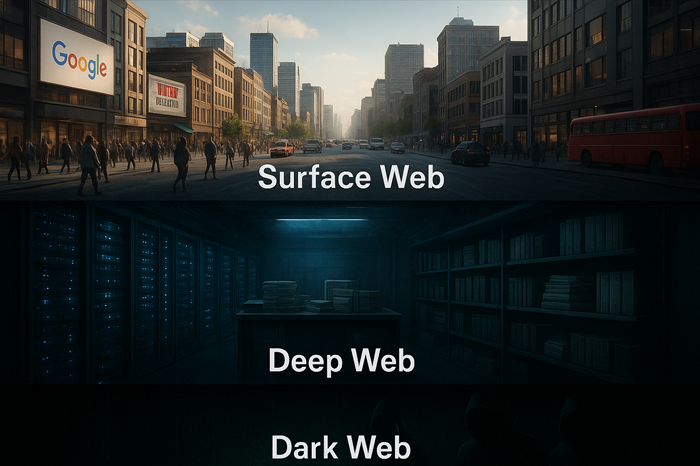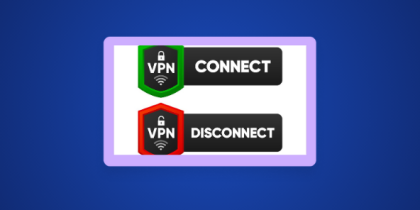The dark web has become one of the most intriguing and misunderstood concepts. Movies often depict it as a chaotic underground where hackers wear hoodies, type at lightning speed, and pull off cybercrimes within seconds. Reality is more complex!
Although the dark web is dangerous, Hollywood’s portrayal is often misleading, leading to misconceptions about its scale, accessibility, and purpose. In this blog, we’ll see the key differences between dark web fiction and reality, examine famous movie portrayals, and discuss why an accurate understanding is important if you want to keep your identity private and safe.
What is Dark Web: Fact Before Fiction

Before comparing movies and reality, it’s important to clarify what the dark web actually is. The internet is roughly divided into three parts:
- Surface Web: The publicly accessible part of the internet (Google, YouTube, news sites).
- Deep Web: Private databases, academic journals, and content not indexed by search engines.
- Dark Web: A small, encrypted part of the deep web accessible via special browsers like Tor.
Key Facts About the Dark Web
- Accounts for roughly 5–6% of total internet content.
- Requires anonymity tools like Tor or I2P.
- Hosts both legal (whistleblower platforms, privacy tools) and illegal (drug markets, hacking forums) activities.
Reality Check:
In truth, accessing the dark web is not as simple as typing “dark web” into Google. It requires security precautions and knowledge of hidden URLs. Movies often skip this entirely.
Hollywood’s Version of the Dark Web
The film industry has used the dark web as a plot device for over a decade. Some portrayals are semi-accurate, others are pure fantasy.
Famous Movies & Their Portrayals
| Movie Title | Year | Focus / Premise | Accuracy & Tone Assessment |
| Red Rooms | 2024 | Psychological techno-thriller exploring online voyeurism and “red-room” serial-killer fascination. | Darkly unsettling, rooted in digital culture commentary. |
| DarkGame | 2024 | A murder game livestreamed as a twisted show on the dark web. | Intense and sensational; speculative thriller tone. |
| Evicted | 2025 | Comedic dark web app used by landlords for unconventional eviction schemes during a pandemic. | Dark satire drawing from current societal issues. |
| Self Reliance | 2024 | A deadly game offered via dark web; a hunted man with paranoia and dark humor. | Stylish thriller blending reality with surreal intensity. |
| Girl in the Video | 2024 | A mother discovers her daughter is kidnapped by a predator streaming live abuse via the dark web. | Harrowing and emotionally charged depiction of digital crimes. |
| Silk Road | 2021 | True-crime thriller about Ross Ulbricht’s dark web marketplace and the FBI investigation. | Grounded in real events; moderate dramatic license. |
| Dark Web: Cicada 3301 | 2021 | Hacker drawn into a cryptic dark web recruitment puzzle tied to a real-world enigmatic organization. | Lighthearted yet speculative; accurate cryptography references. |
| Unfriended: Dark Web | 2018 | Screenlife horror: friends hacked and terrorized after discovering a criminal’s laptop tied to the dark web. | Overdramatic, tech-sensationalized, but cleverly staged. |
| The Den | 2013 | Thriller where a woman witnesses a murder via webcam and is stalked through the dark web. | Creepy and realistic depiction. |
| Deep Web (doc) | 2015 | Documentary on Silk Road’s rise and the arrest of its founder Ross Ulbricht. | Factually solid and insightful. |
Common Hollywood Tropes:
- Hackers typing furiously with endless green code on the screen.
- Instant access to black market services.
- Hyper-violent and sensational criminal offerings.
- One-click “trace” tools and instant location tracking.
Reality Check: What the Dark Web Looks Like
If you enter the dark web in reality, you won’t see flashing neon menus for “hire a hitman” or “buy any drug instantly.” Instead:
- Many sites are plain text and minimal in design.
- Transactions require cryptocurrency like Bitcoin or Monero.
- Scams are common; many sites vanish after taking payments.
- Forums operate under strict rules, often requiring vetting or a reputation to access higher-tier discussions.
A dark web drug marketplace may look like a bare-bones eBay clone with product listings, seller ratings, and escrow systems, not the cinematic “auction for lives” seen in movies.
Why Hollywood Exaggerates the Dark Web
The main reasons are narrative pacing, visual appeal, and dramatic stakes. Complexity doesn’t sell tickets, real dark web operations involve encryption keys, long waiting times, and the risk of scams. That’s not thrilling on screen. Films compress events into minutes to keep viewers engaged.
The “green matrix code” look provides a universal signal to audiences it is hacking. Plus, they portray the dark web as an easy shorthand for “dangerous and mysterious,” to create a hook.
The Dangerous Myths Movies Create
While entertaining, movie portrayals can lead to misinformation and risky behavior:
Myth#1
- Anyone can access the dark web instantly.
- Truth: It requires tools, knowledge, and risk management.
Myth#2
- Everything on the dark web is illegal.
- Truth: There are legal and beneficial uses, such as secure journalism.
Myth#3
- Hiring criminals online is straightforward and safe.
- Truth: Most “hitman” services are scams or law enforcement stings.
Myth#4
- Hackers can breach any system in seconds.
- Truth: Real breaches often take weeks or months of planning.
Movies That Got Showed Dark Web Mostly the Right Way
When it comes to movies about the dark web, most Hollywood thrillers still crank up the drama and toss in some flashy hacking sequences that have little to do with reality. But a few titles have managed to get close to the truth, at least enough that someone familiar with the tech won’t roll their eyes every five minutes.
Take Silk Road (2021), for example. While it adds some cinematic flair, its portrayal of how an online black market functioned, the role of cryptocurrency, and the cat-and-mouse chase with federal agents is grounded in actual events.
Then there’s Red Rooms (2024), which, while disturbing, captures the obsession with “red room” myths and the real-world fascination with digital anonymity without making it look like a video game.
On the documentary side, Deep Web (2015) still stands out years later for its factual and serious exploration of the Silk Road case and how the dark web operates beyond the fear-mongering headlines.
Even The Den (2013) deserves a mention; its depiction of webcam vulnerabilities and online stalking feels plausible, even if it goes into horror territory. And while Dark Web: Cicada 3301 (2021) plays things a bit loose with its high-energy chase scenes, its nods to real cryptographic puzzles and hidden online communities are based on genuine cases.
How to Separate Dark Web Fact from Fiction
If you want to know the reality behind cinematic portrayals:
- Follow Cybersecurity News and Forums– Websites that publish news about the latest threats and vulnerabilities and forums like Reddit.
- Read Court Cases – Dark web prosecutions often reveal operational details.
- Check OSINT Reports – Open-source intelligence firms publish threat analysis.
- Watch Documentaries – Non-fiction media often prioritizes accuracy over drama.
What are the Risks of Visiting the Dark Web
Movies might exaggerate how the dark web works, but dangers do exist, and it is extremely important for you to keep your data and identity safe.
- Malware & Phishing – Clicking random .onion links can lead to infecting your device and leading to exposing your data via fake emails, calls or messages.
- Law Enforcement Stings – Some illegal services are traps and might be the way law enforcement agencies are working to track you.
- Financial Loss – Your essential data may be used for financial scams, leading to loss of assets.
- Identity Exposure – Misconfigured Tor setups can reveal your IP.
If exploring for research or education, use PureVPN + Tor, disable scripts, and avoid logging into personal accounts.
How to Keep Yourself Secure from the Dark Web
The dark web is a threat, and if your data is in the hands of exploiters, it can be sold multiple times for identity theft and malware distribution. You must stay proactive to prevent your data from being misused:
- Enable MFA
- Keep software updated
- Monitor your accounts
- Avoid unprotected networks
- Enable dark web monitoring.
PureVPN’s dark web monitoring alerts send you notifications whenever your data is found on the dark web. Also, get real-time alerts about the unauthentic sharing of your data by data brokers, manage your social accounts, and block trackers for complete privacy.
How to Enable Dark Web Monitoring on PureVPN
- Install PureVPN on your device or update your existing VPN app.
- Visit the Members Area to get access.
- Go to Dark Web Monitoring from the main menu.
- Select Add Assets to Monitor.
- Add your email address, SSN, credit card number, passport number, and phone number.
- Mention the code sent to your registered number, and you’re done.
7. Take the recommended steps if your data is part of a breach.
8. You can mark the breaches as resolved.
Frequently Asked Questions
Despite their popularity in horror thrillers, there’s no verified evidence that “red rooms” (live-streamed murders for paying audiences) exist on the dark web.
In reality, hacking involves patience, research, and exploiting vulnerabilities, often through social engineering rather than typing furiously for 10 seconds to “bypass a firewall” like in the movies.
No. While illicit trade and cybercrime are common, the dark web also hosts whistleblower platforms, private communication channels for activists, and secure forums for journalists in restrictive regions.
Crime-driven plots offer higher stakes and immediate drama, which is easier to market. Legal or ethical uses of the dark web rarely have the same mainstream entertainment appeal.
Final Thoughts
The dark web is neither the lawless free-for-all of Hollywood nightmares nor harmless. It can be used for privacy, research, activism, or crime.
Movies will continue to exaggerate because drama sells, but separating cinematic suspense from reality is important. If your perception of the dark web comes solely from movies, you’re only seeing half the picture. Know the risks!








